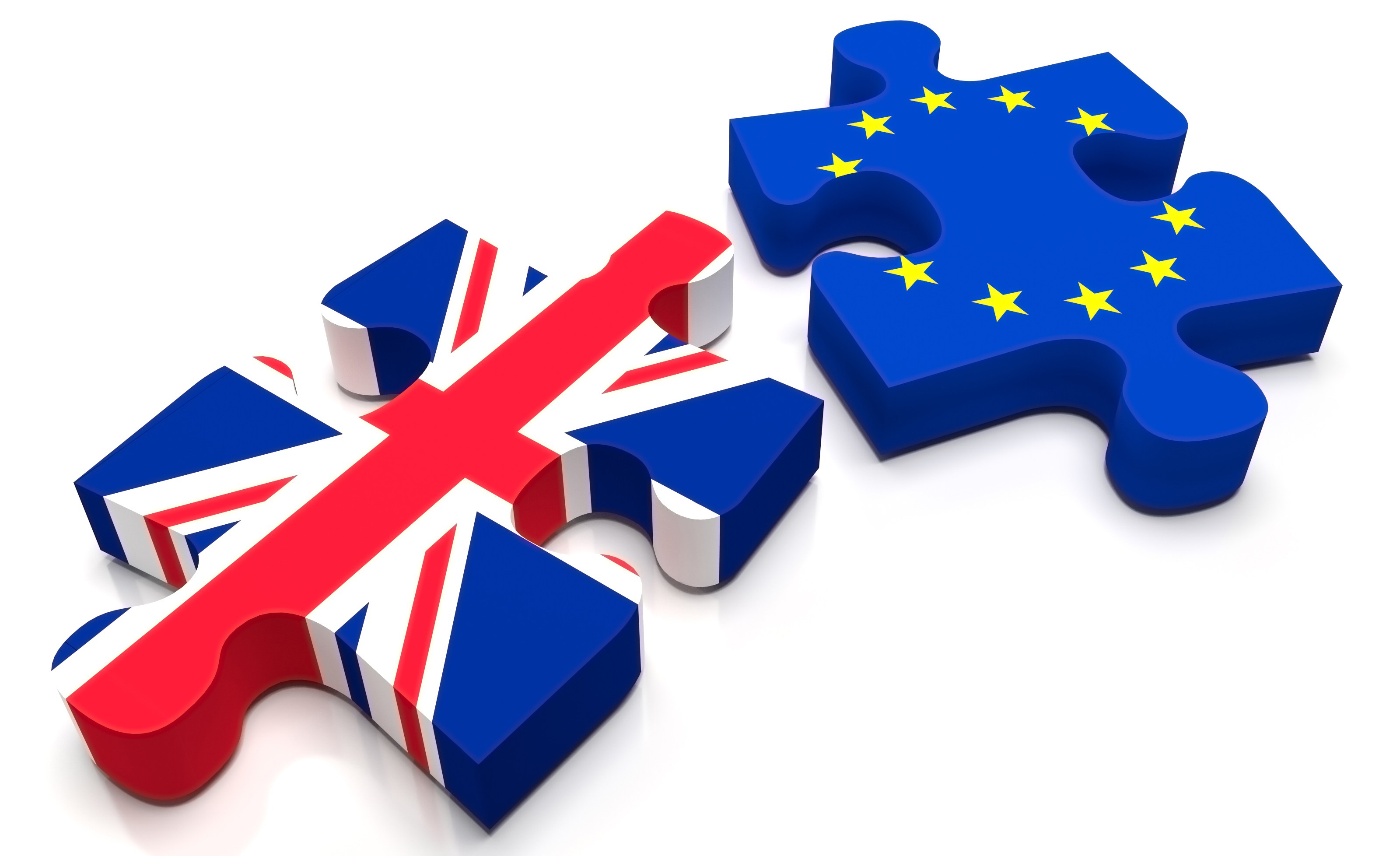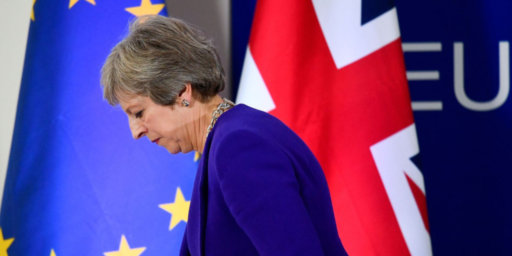Brexit Faces Decisive Vote In House Of Commons
Later today, Theresa May's Brexit deal will face a decisive vote in the House of Commons in a vote that could have implications for May's own hold on power.

Later today, the British House of Commons will take a vote that will decide the future of the Brexit deal negotiated by Prime Minister Theresa May, and could have a significant impact on the question of just how long May’s grip on power lasts:
Since June 2016, when 52 percent of British voters approved a referendum to leave the European Union, everything has built up to the vote on Tuesday. The bill would determine the trade and immigration relationship between Britain and the bloc through the end of 2020, while a permanent agreement is negotiated.
But even before Mrs. May’s deal with Brussels was made public in November, it was clear that Parliament was deeply fragmented on how to move forward. Lawmakers began several days of debate on Prime Minister Theresa May’s bill in December, but she postponed the vote for a month, rather than face a humiliating defeat, as she tried to win new promises from Brussels.
But the parliamentary calculus has not changed. Mrs. May’s Conservative Party is divided over the plan — one of her whips stepped down on Monday so that he could vote against it, the latest in a long string of Brexit-related resignations — and the opposition parties overwhelmingly oppose it.
As the vote approaches, Prime Minister May is making a last-minute appeal to her party to stick together:
Facing possible defeat in a fateful vote looming in the House of Commons over her plan to leave the European Union, British Prime Minister Theresa May on Monday warned lawmakers they must honor the results of the 2016 referendum and deliver Brexit to the people.
In a speech to workers at a British pottery manufacturer in the town of Stoke-on-Trent, where two-thirds of voters cast ballots to leave the European bloc, May told the rebels in her Conservative Party that they faced a stark choice: either accept her imperfect but doable deal or cut ties with Europe with no deal at all, an option now favored by many of her fellow Tories but which economists predict could inflict chaos and financial pain.
“With no deal, we would have no implementation period, no security cooperation, no guarantees for U.K. citizens overseas, no certainty for businesses and workers here in Stoke and across the U.K,” the prime minister said.
Just an hour after her remarks, one of May’s Conservative Party whips in Parliament, Gareth Johnson, whose job it is to wrangle votes for the prime minister’s agenda, abruptly resigned. Johnson said he could not support May’s half-in, half-out compromise deal, which he said “prevents us taking back control and instead could leave us perpetually constrained by the European Union.” He was the 13th member of May’s government to quit over Brexit.
On the eve of Tuesday’s vote in the House of Commons, lawmakers remained deeply unhappy with the terms of the withdrawal agreement that May spent two years negotiating in Brussels.
The opponents — led by former foreign minister Boris Johnson and former Brexit secretary David Davis — say May’s accord condemns Britain to be a “vassal” of Europe, taking laws but not writing them. The Euroskeptics argue that the 585-page withdrawal agreement keeps Britain too closely aligned with European tariff rules and customs regulations, and forestalls bigger, better trade deals around the world.
President Trump has warned that May’s deal might make it hard to forge a new trade accord with the United States. The U.S. ambassador to Britain, Woody Johnson, suggested the same, saying a “quick, massive, bilateral trade deal” would be blocked by May’s pact. The British prime minister, blindsided by Washington, responded by saying she didn’t agree.
efore making any new deals, May has struggled to extricate Britain from the E.U. She has steadfastly argued that critics such as Boris Johnson and Davis may complain all they like, but they could never get a better offer.
During a speech to Parliament on Monday, May urged skeptical lawmakers to think again.
“Whatever you may have previously concluded, over these next 24 hours, give this deal a second look,” May said. “No, it is not perfect. And yes, it is a compromise. But when the history books are written, people will look at the decision of this House tomorrow and ask: Did we deliver on the country’s vote to leave the European Union?”
In response, the leader of the Labour Party, Jeremy Corbyn, said that nothing had changed since December, when May pulled the vote because it was facing defeat. He called on lawmakers to “reject a deal that is clearly bad for this country.”
Parliament is divided among those who grudgingly support May’s deal; those who want her to try to renegotiate it; those who want to leave now with no deal; and those who don’t want to leave Europe at all but instead are pressing for a second referendum, a do-over, where the British people would be asked again — knowing all they know now — what they really want.
But May warned that “we would risk a subversion of the democratic process” if the Brexit project is abandoned.
“I ask MPs to consider the consequences of their actions on the faith of the British people in our democracy,” she said.
“What if we found ourselves in a situation where Parliament tried to take the U.K. out of the E.U. in opposition to a remain vote? People’s faith in the democratic process and their politicians would suffer catastrophic harm,” she said. ”We all have a duty to implement the result of the referendum.”
May again pledged that “we are leaving on the 29th of March” and that she did not want to extend the deadline, as many have urged, by extending or revoking Article 50, which dictates the time table.
But if May loses Tuesday in the House of Commons — and keeps her job and goes back to Brussels to talk more — then it is possible the deadline would be extended.
May long promised fresh assurances from Brussels, and Monday, she presented a letter from E.U. chiefs that she said bolstered her case that her withdrawal agreement was the “best deal possible” and “worthy” of lawmakers’ support.
In their five-page correspondence, European Council President Donald Tusk and European Commission President Jean-Claude Juncker stressed that “we are not in a position to agree to anything that changes or is inconsistent with the Withdrawal Agreement.”
But they did address the thorny issue of the “Irish backstop,” a guarantee that seeks to ensure that there is no hard border on the island of Ireland. Many of May’s critics fear that it could lead to Britain being permanently trapped in an E.U. customs union.
Tusk and Juncker wrote that they did “not wish to see the backstop enter into force,” which would “represent a suboptimal trading arrangement for both sides.” They said the E.U. would work “as quickly as possible” to strike a new arrangement with Britain that would mean the backstop wouldn’t kick in.
May said that the letters she and the E.U. leaders exchanged have “legal force” and “make absolutely clear the backstop is not a threat or a trap.”
But the note didn’t quiet May’s critics, who said the assurances were vague and didn’t go far enough— that essentially the letter was a nothingburger.
“The letter certainly isn’t legally binding,” Nigel Dodds, deputy leader of the Democratic Unionist Party, told the BBC. “The prime minister is going to struggle to justify what the delay was about.”
The DUP is a Northern Irish party that props up May’s minority Conservative government.
The British leader said she knew that the letters “do not go as far as some MPs would like” but added, “I am convinced that MPs now have the clearest assurances that this is the best deal possible and that it is worthy of their support.”
Before making any new deals, May has struggled to extricate Britain from the E.U. She has steadfastly argued that critics such as Boris Johnson and Davis may complain all they like, but they could never get a better offer.
During a speech to Parliament on Monday, May urged skeptical lawmakers to think again.
“Whatever you may have previously concluded, over these next 24 hours, give this deal a second look,” May said. “No, it is not perfect. And yes, it is a compromise. But when the history books are written, people will look at the decision of this House tomorrow and ask: Did we deliver on the country’s vote to leave the European Union?”
In response, the leader of the Labour Party, Jeremy Corbyn, said that nothing had changed since December, when May pulled the vote because it was facing defeat. He called on lawmakers to “reject a deal that is clearly bad for this country.”
Parliament is divided among those who grudgingly support May’s deal; those who want her to try to renegotiate it; those who want to leave now with no deal; and those who don’t want to leave Europe at all but instead are pressing for a second referendum, a do-over, where the British people would be asked again — knowing all they know now — what they really want.
But May warned that “we would risk a subversion of the democratic process” if the Brexit project is abandoned.
“I ask MPs to consider the consequences of their actions on the faith of the British people in our democracy,” she said.
“What if we found ourselves in a situation where Parliament tried to take the U.K. out of the E.U. in opposition to a remain vote? People’s faith in the democratic process and their politicians would suffer catastrophic harm,” she said. ”We all have a duty to implement the result of the referendum.”
May again pledged that “we are leaving on the 29th of March” and that she did not want to extend the deadline, as many have urged, by extending or revoking Article 50, which dictates the time table.
But if May loses Tuesday in the House of Commons — and keeps her job and goes back to Brussels to talk more — then it is possible the deadline would be extended.
All of this comes a month after May postponed a vote in the House of Commons on the deal after it became clear that she lacked the vote to get it approved even among the members of her own governing coalition. This happened at the same time as a ruling from Europe’s highest court that appeared to give both parties a way out of the consequences of a “hard,” meaning no-deal, Brexit via a ruling that said that a member nation could choose to forgo exiting the European Union even after invoking the provisions of Article 50 of the European Union treaty, a decision that presumably also means that the time limits set forth in that article are flexible and that they could be extended with the consent of both parties. Potentially, that means that the March 29th deadline could be extended if May loses the vote today, but that depends on whether or not she seeks to see that happen. Such a delay may also be necessary if a negative vote today leads to a no-confidence crisis for the governing coalition. May survived a no-confidence vote inside her own party last month and is safe from such a vote for at least another year, but she could face a political crisis if she loses today and ends up facing a general no-confidence vote in the House of Commons or otherwise sees her coalition with the Democratic Unionist Party collapse to the point where she can no longer count on their votes. If that happens and new elections are required, admittedly an unlikely scenario even as bad as things are right now, then a delay in Brexit will be inevitably required.
The debate in the House of Commons will continue later today, and there will be preliminary votes on a number of amendments, many of which are clearly intended to undercut the deal that May negotiated. Most of those amendments are expected to fail on party-line votes. The final vote on the deal itself is scheduled to take place around 7:00 p.m. local time, or roughly 2:00 p.m. Eastern Standard Time here in the United States. As things stand now, I can’t say for sure if any of those proceedings will be available to view in the United States. Ordinarily, this might be something that C-Span would cover, but with both the Senate and House of Representatives back in session, and the Senate Judiciary Committee meeting on the confirmation of William Barr to be Attorney General, I’m not sure there will be room in C-Span’s broadcast schedule to do so. If I see any word about where you can watch the proceedings, I’ll post it in an update to this post. In the meantime, we’ll know the outcome of the vote by this afternoon here in the United States. What happens after that is anyone’s guess.





The only reason I can see not to hold a second referendum, is that “leave” might win again regardless of what current polling indicates.
The ultra-Brexiters have the bit between their teeth and are perfectly happy to gallop off the cliff for their beloved “WTO exit”, convinced that they will all sprout wings and learn to fly before hitting the rocks at the bottom.
Sometimes you have to let the idiots fall off the ledge. Especially when they’re convinced that a big game of bluffing is the way for them to get whatever they want.
The tendency of the Brits to assume that the other side is bluffing and the only thing they have to do to win totally is “hold firm!” never fails to amaze me. (How you can tell a movie script is written by a Brit? Invariably, a protagonist will say at some point: “you’re bluffing!”)
They did it earlier in their negotiations with Russia, with the result that Russia ended up on the other side and they’re now trying it with the rest of the EU. I suspect the EU will soon mutter “bugger this for a lot of soldiers” and just….allow the UK to float off into la-la land.
@Kathy: A reason not to hold it is there is not enough time left and to organize well such a referendum – what choice? Leave, Remain – how defined, how to avoid Magical Thinking votes – to achieve a coherent result that would not risk generating more chaos.
@Lounsbury: Well, now that May’s plan has been rejected by Parliament, aren’t the only options Remain and Hard Brexit?
That simplifies the options.
And a new Referendum is their only way out of this mess. If the people vote for Hard Brexit, that’s kind of on them.
The first Brexit vote was where voters could believe in unicorns and fairy dust making it all great and that there would be no downsides at all. Now, after so many stories about how the sausage is made, or in this case half made and dropped on the floor, they are much better informed.
@Gustopher:
Like that matters. Look at our own home-grown stupidity. How many stories were there about Trump’s behavior that his voters ignored only to watch him do it to them? Not paying his workers, the nasty comments, horrible deal-maker that kills companies left and right….. the voters were informed and STILL choose him. Because it was never about being informed – it was always about the delusion represented. The delusion is more important then reality and as @grumpy pointed out, they’ll gladly walk off that cliff after shoving everyone else of it first.
A vote today would go for Hard Brexit and the point of no return. Once that happens and it all goes to shit, voters would then complain, not about their choice, but about how the world didn’t live up to their fantasies and this wasn’t how it was supposed to go. At this point, we can only let them hurl themselves off the ledge and hope against hope it dissuades others from doing so. You can’t save them all….
230 vote majority against!
Holy hell! 432 votes. That’s c. 2/3 of Parliament!
Now what?
First, Corbyn has moved a No Confidence vote for tomorrow; but I’d still bet on May winning that. Conservative and DUP MPs unlikely to be the sheep voting for Easter.
So, May will then try to get EU to put a lick of paint on the deal and bring it back, in the hope that the non-ERG opposition will crumble; and if they don’t she’ll try the same again.
And again.
And again….
Thing is, May’s tactics are fundamentally flawed.
She refuses to rule out No Deal, probably to minimise internal damage to the Conservative party-in-the-country. But unless she does rule it out ERG and DUP have zero incentive to swing to her deal.
If she had finessed a situation that ruled out a No Deal , ERG/DUP would have broken, and could most likely contain a possible Remainer-Con revolt by using intra-party arm twisting.
Now we are into a stage when/if Labour election bid fails, next step has to be either May accepts that and rules out No Deal, (but May has little credit left with anyone) or Remainers are forced to try to mount a cross-party revolt.
The problem with that:
To avoid the time constraint Lounsbury notes, a referendum almost certainly requires asking the EU for an agreed extension of the Article 50 period and repealing the current legal leave date of 31 March.
And BOTH are in the hands of the Government NOT Parliament; for Parliament to wrest this out of the hands of Govt. requires some serious constitutional jury rigging.
Speaker Bercow has shown he is willing to extend the role of Parliament to the maximum, much as that discomfits governmentalists who have come to view Parlt. as little more than a standing electoral college for a “Presidential” govt.
But unless May changes course radically to accommodate Parliament via EEA/EFTA option, &/or second referendum, we’re into full on constitutional crisis. (Because then Parlt. really are encroaching on Executive prerogative. Rather than the contrary which the idiots of both govt. and hard Brexiteers have been doing for years.)
Alternative, National Government: but I’m not even sure if there are means to force both the Govt. and Official Opposition aside (because if Corbyn still controls Labour I cannot see him accepting coalition, esp. if he couldn’t be PM).
God.
Time for more Armagnac.
(Hah. Just thought. Perfect National Government PM. BoJo. 🙂 He’d betray Leave in a hot second for the Premiership, and possibly split the Tory activists. Shame nobody who knows him trusts him further than they can spit.)
@KM: The fine folks in Britain should now have a very clear idea that Brexit is not a trivial thing — “who knew health care would be so hard!” — and that there would be some very real negatives.
Give them another chance, before executing their previous instructions to leave.
But, at some point, you have to respect the will of the people.
Not with Trump, of course, because he didn’t get a majority or even a plurality.
This is a vey good first take by Ian Dunt at politics.co.uk
Before the vote but smart analysis IMHO, Rafael Behr in the Guardian.